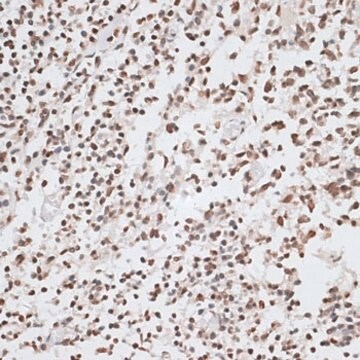推荐产品
生物源
mouse
品質等級
抗體表格
purified immunoglobulin
抗體產品種類
primary antibodies
無性繁殖
9A12, monoclonal
物種活性
human
技術
electrophoretic mobility shift assay: suitable
immunocytochemistry: suitable
immunoprecipitation (IP): suitable
western blot: suitable
同型
IgG1κ
NCBI登錄號
UniProt登錄號
運輸包裝
wet ice
目標翻譯後修改
unmodified
基因資訊
human ... DUX4(100288687)
一般說明
Dux4 is a homeodomain protein with a similar protein sequence to Pax3 and Pax7. Defects in Dux4 may be the cause of facioscapulohumeral muscular dystrophy (FSHD). FSHD is characterized by weakness of the muscles of the face, upper-arm and shoulder girdle. Ectopic expression of Dux4 in skeletal muscle activates the expression of stem cell and germline genes, and, when overexpressed in somatic cells, Dux4 can ultimately lead to cell death.
免疫原
Epitope: domain of: C-Terminal region
recombinant protein corresponding to the domain of: C-Terminal region of Human Dux4.
應用
Detect Dux4 using this mouse monoclonal antibody, Anti-Dux4 Antibody, clone 9A12 validated for use in western blotting, ICC, Electrophoretic Mobility Shift Assay & IP.
Research Category
Stem Cell Research
Stem Cell Research
Stem Cell Research
Stem Cell Research
Research Sub Category
Muscle Physiology
Developmental Signaling
Muscle Physiology
Developmental Signaling
This antibody has been shown to work in immunocytochemistry applications (Dixit et al. 2007). This antibody has been shown to work in electrophoretic mobility shift assays (Dixit et al. 2007). This antibody has been shown to work in immunoprecipitation applications (Anseau et al., 2009).
品質
Evaluated by Western Blot in a human skeletal muscle tissue lysate. Western Blot Analysis: A 1:250 dilution of this antibody detected Dux4 in a human skeletal muscle tissue lysate.
標靶描述
~58 kDa observed
外觀
Protein G Purified
Format: Purified
Purified mouse monoclonal IgG1κ supernatant in buffer containing 0.1 M Tris-Glycine (pH 7.4), 150 mM NaCl with 0.05% sodium azide.
儲存和穩定性
Stable for 1 year at 2-8°C from date of receipt.
分析報告
Control
Human skeletal muscle tissue lysate.
Human skeletal muscle tissue lysate.
其他說明
Concentration: Please refer to the Certificate of Analysis for the lot-specific concentration.
免責聲明
Unless otherwise stated in our catalog or other company documentation accompanying the product(s), our products are intended for research use only and are not to be used for any other purpose, which includes but is not limited to, unauthorized commercial uses, in vitro diagnostic uses, ex vivo or in vivo therapeutic uses or any type of consumption or application to humans or animals.
未找到合适的产品?
试试我们的产品选型工具.
儲存類別代碼
12 - Non Combustible Liquids
水污染物質分類(WGK)
WGK 1
閃點(°F)
Not applicable
閃點(°C)
Not applicable
Eugénie Ansseau et al.
PloS one, 4(10), e7482-e7482 (2009-10-16)
Facioscapulohumeral muscular dystrophy (FSHD) is a dominant disease linked to contractions of the D4Z4 repeat array in 4q35. We have previously identified a double homeobox gene (DUX4) within each D4Z4 unit that encodes a transcription factor expressed in FSHD but
Eugénie Ansseau et al.
Genes, 8(3) (2017-03-10)
FacioScapuloHumeral muscular Dystrophy (FSHD) is one of the most prevalent hereditary myopathies and is generally characterized by progressive muscle atrophy affecting the face, scapular fixators; upper arms and distal lower legs. The FSHD locus maps to a macrosatellite D4Z4 repeat
Louise A Moyle et al.
eLife, 5 (2016-11-15)
Facioscapulohumeral muscular dystrophy (FSHD) involves sporadic expression of DUX4, which inhibits myogenesis and is pro-apoptotic. To identify target genes, we over-expressed DUX4 in myoblasts and found that the receptor tyrosine kinase Ret was significantly up-regulated, suggesting a role in FSHD.
Céline Vanderplanck et al.
Skeletal muscle, 8(1), 2-2 (2018-01-14)
Facioscapulohumeral muscular dystrophy (FSHD) is associated with DNA hypomethylation at the 4q35 D4Z4 repeat array. Both the causal gene DUX4 and its homolog DUX4c are induced. DUX4c is immunodetected in every myonucleus of proliferative cells, while DUX4 is present in
我们的科学家团队拥有各种研究领域经验,包括生命科学、材料科学、化学合成、色谱、分析及许多其他领域.
联系技术服务部门